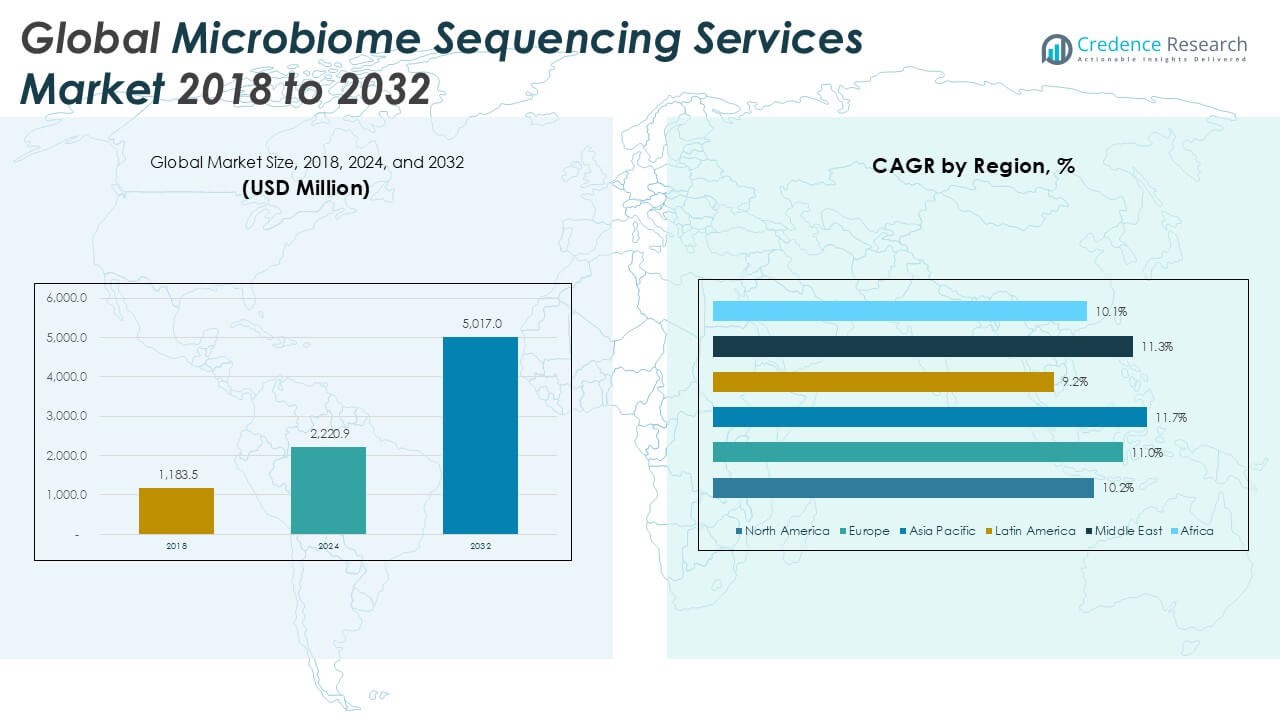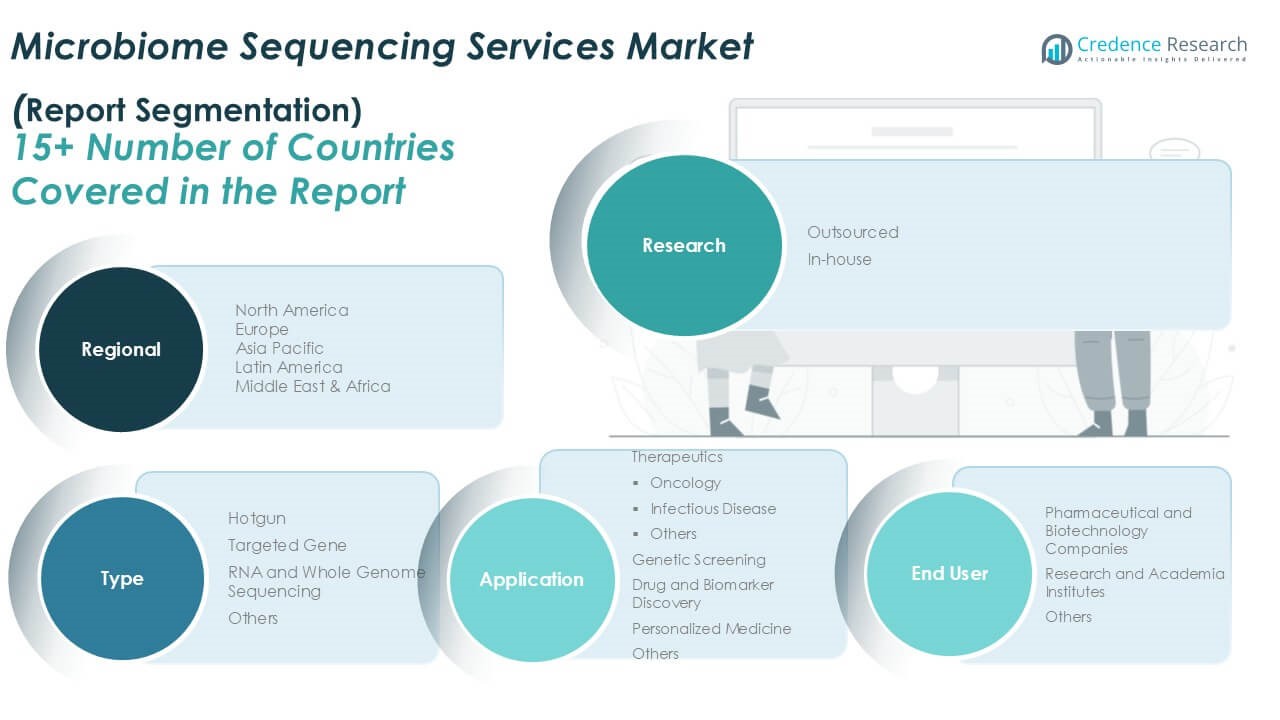CHAPTER NO. 1 : GENESIS OF THE MARKET
1.1 Market Prelude – Introduction & Scope
1.2 The Big Picture – Objectives & Vision
1.3 Strategic Edge – Unique Value Proposition
1.4 Stakeholder Compass – Key Beneficiaries
CHAPTER NO. 2 : EXECUTIVE LENS
2.1 Pulse of the Industry – Market Snapshot
2.2 Growth Arc – Revenue Projections (USD Million)
2.3. Premium Insights – Based on Primary Interviews
CHAPTER NO. 3 : MICROBIOME SEQUENCING SERVICES MARKET FORCES & INDUSTRY PULSE
3.1 Foundations of Change – Market Overview
3.2 Catalysts of Expansion – Key Market Drivers
3.2.1 Momentum Boosters – Growth Triggers
3.2.2 Innovation Fuel – Disruptive Technologies
3.3 Headwinds & Crosswinds – Market Restraints
3.3.1 Regulatory Tides – Compliance Challenges
3.3.2 Economic Frictions – Inflationary Pressures
3.4 Untapped Horizons – Growth Potential & Opportunities
3.5 Strategic Navigation – Industry Frameworks
3.5.1 Market Equilibrium – Porter’s Five Forces
3.5.2 Ecosystem Dynamics – Value Chain Analysis
3.5.3 Macro Forces – PESTEL Breakdown
3.6 Price Trend Analysis
3.6.1 Regional Price Trend
3.6.2 Price Trend By Research
CHAPTER NO. 4 : KEY INVESTMENT EPICENTER
4.1 Regional Goldmines – High-Growth Geographies
4.2 Research Frontiers – Lucrative Research Categories
4.3 Type Sweet Spots – Emerging Demand Segments
CHAPTER NO. 5: REVENUE TRAJECTORY & WEALTH MAPPING
5.1 Momentum Metrics – Forecast & Growth Curves
5.2 Regional Revenue Footprint – Market Share Insights
5.3 Segmental Wealth Flow – Research, Type, Application & End User Industry Revenue
CHAPTER NO. 6 : TRADE & COMMERCE ANALYSIS
6.1. Import Analysis By Region
6.1.1. Global Microbiome Sequencing Services Market Import Revenue By Region
6.2. Export Analysis By Region
6.2.1. Global Microbiome Sequencing Services Market Export Revenue By Region
CHAPTER NO. 7 : COMPETITION ANALYSIS
7.1. Company Market Share Analysis
7.1.1. Global Microbiome Sequencing Services Market: Company Market Share
7.2. Global Microbiome Sequencing Services Market Company Revenue Market Share
7.3. Strategic Developments
7.3.1. Acquisitions & Mergers
7.3.2. New Research Launch
7.3.3. Regional Expansion
7.4. Competitive Dashboard
7.5. Company Assessment Metrics, 2024
CHAPTER NO. 8 : MICROBIOME SEQUENCING SERVICES MARKET – BY RESEARCH SEGMENT ANALYSIS
8.1. Microbiome Sequencing Services Market Overview By Research Segment
8.1.1. Microbiome Sequencing Services Market Revenue Share By Research
8.2. Plasma Derived and Recombinant Coagulation
8.3. Outsourced
8.4. In-house
CHAPTER NO. 9 : MICROBIOME SEQUENCING SERVICES MARKET – BY TYPE SEGMENT ANALYSIS
9.1. Microbiome Sequencing Services Market Overview By Type Segment
9.1.1. Microbiome Sequencing Services Market Revenue Share By Type
9.2. Hotgun
9.3. Targeted Gene
9.4. RNA and Whole Genome Sequencing
9.5. Others
CHAPTER NO. 10 : MICROBIOME SEQUENCING SERVICES MARKET – BY APPLICATION SEGMENT ANALYSIS
10.1. Microbiome Sequencing Services Market Overview By Application Segment
10.1.1. Microbiome Sequencing Services Market Revenue Share By Application
10.2. Therapeutics
10.2.1. Oncology
10.2.2. Infectious Disease
10.2.3. Others
10.3. Genetic Screening
10.4 Drug and Biomarker Discovery
10.5. Personalized Medicine
10.6. Others
CHAPTER NO. 11 : MICROBIOME SEQUENCING SERVICES MARKET – BY END USER INDUSTRY SEGMENT ANALYSIS
11.1. Microbiome Sequencing Services Market Overview By End User Industry Segment
11.1.1. Microbiome Sequencing Services Market Revenue Share By End User Industry
11.2. Pharmaceutical and Biotechnology Companies
11.3. Research and Academia Institutes
11.4. Others
CHAPTER NO. 12 : MICROBIOME SEQUENCING SERVICES MARKET – REGIONAL ANALYSIS
12.1. Microbiome Sequencing Services Market Overview By Region Segment
12.1.1. Global Microbiome Sequencing Services Market Revenue Share By Region
12.1.2. Regions
12.1.3. Global Microbiome Sequencing Services Market Revenue By Region
12.1.4. Research
12.1.5. Global Microbiome Sequencing Services Market Revenue By Research
12.1.6. Type
12.1.7. Global Microbiome Sequencing Services Market Revenue By Type
12.1.8. Application
12.1.9. Global Microbiome Sequencing Services Market Revenue By Application
12.1.10. End User Industry
12.1.11. Global Microbiome Sequencing Services Market Revenue By End User Industry
CHAPTER NO. 13 : NORTH AMERICA MICROBIOME SEQUENCING SERVICES MARKET – COUNTRY ANALYSIS
13.1. North America Microbiome Sequencing Services Market Overview By Country Segment
13.1.1. North America Microbiome Sequencing Services Market Revenue Share By Region
13.2. North America
13.2.1. North America Microbiome Sequencing Services Market Revenue By Country
13.2.2. Research
13.2.3. North America Microbiome Sequencing Services Market Revenue By Research
13.2.4. Type
13.2.5. North America Microbiome Sequencing Services Market Revenue By Type
13.2.6. Application
13.2.7. North America Microbiome Sequencing Services Market Revenue By Application
13.2.8. End User Industry
13.2.9. North America Microbiome Sequencing Services Market Revenue By End User Industry
13.3. U.S.
13.4. Canada
13.5. Mexico
CHAPTER NO. 14 : EUROPE MICROBIOME SEQUENCING SERVICES MARKET – COUNTRY ANALYSIS
14.1. Europe Microbiome Sequencing Services Market Overview By Country Segment
14.1.1. Europe Microbiome Sequencing Services Market Revenue Share By Region
14.2. Europe
14.2.1. Europe Microbiome Sequencing Services Market Revenue By Country
14.2.2. Research
14.2.3. Europe Microbiome Sequencing Services Market Revenue By Research
14.2.4. Type
14.2.5. Europe Microbiome Sequencing Services Market Revenue By Type
14.2.6. Application
14.2.7. Europe Microbiome Sequencing Services Market Revenue By Application
14.2.8. End User Industry
14.2.9. Europe Microbiome Sequencing Services Market Revenue By End User Industry
14.3. UK
14.4. France
14.5. Germany
14.6. Italy
14.7. Spain
14.8. Russia
14.9. Rest of Europe
CHAPTER NO. 15 : ASIA PACIFIC MICROBIOME SEQUENCING SERVICES MARKET – COUNTRY ANALYSIS
15.1. Asia Pacific Microbiome Sequencing Services Market Overview By Country Segment
15.1.1. Asia Pacific Microbiome Sequencing Services Market Revenue Share By Region
15.2. Asia Pacific
15.2.1. Asia Pacific Microbiome Sequencing Services Market Revenue By Country
15.2.2. Research
15.2.3. Asia Pacific Microbiome Sequencing Services Market Revenue By Research
15.2.4. Type
15.2.5. Asia Pacific Microbiome Sequencing Services Market Revenue By Type
15.2.6. Application
15.2.7. Asia Pacific Microbiome Sequencing Services Market Revenue By Application
15.2.8. End User Industry
15.2.9. Asia Pacific Microbiome Sequencing Services Market Revenue By End User Industry
15.3. China
15.4. Japan
15.5. South Korea
15.6. India
15.7. Australia
15.8. Southeast Asia
15.9. Rest of Asia Pacific
CHAPTER NO. 16 : LATIN AMERICA MICROBIOME SEQUENCING SERVICES MARKET – COUNTRY ANALYSIS
16.1. Latin America Microbiome Sequencing Services Market Overview By Country Segment
16.1.1. Latin America Microbiome Sequencing Services Market Revenue Share By Region
16.2. Latin America
16.2.1. Latin America Microbiome Sequencing Services Market Revenue By Country
16.2.2. Research
16.2.3. Latin America Microbiome Sequencing Services Market Revenue By Research
16.2.4. Type
16.2.5. Latin America Microbiome Sequencing Services Market Revenue By Type
16.2.6. Application
16.2.7. Latin America Microbiome Sequencing Services Market Revenue By Application
16.2.8. End User Industry
16.2.9. Latin America Microbiome Sequencing Services Market Revenue By End User Industry
16.3. Brazil
16.4. Argentina
16.5. Rest of Latin America
CHAPTER NO. 17 : MIDDLE EAST MICROBIOME SEQUENCING SERVICES MARKET – COUNTRY ANALYSIS
17.1. Middle East Microbiome Sequencing Services Market Overview By Country Segment
17.1.1. Middle East Microbiome Sequencing Services Market Revenue Share By Region
17.2. Middle East
17.2.1. Middle East Microbiome Sequencing Services Market Revenue By Country
17.2.2. Research
17.2.3. Middle East Microbiome Sequencing Services Market Revenue By Research
17.2.4. Type
17.2.5. Middle East Microbiome Sequencing Services Market Revenue By Type
17.2.6. Application
17.2.7. Middle East Microbiome Sequencing Services Market Revenue By Application
17.2.8. End User Industry
17.2.9. Middle East Microbiome Sequencing Services Market Revenue By End User Industry
17.3. GCC Countries
17.4. Israel
17.5. Turkey
17.6. Rest of Middle East
CHAPTER NO. 18 : AFRICA MICROBIOME SEQUENCING SERVICES MARKET – COUNTRY ANALYSIS
18.1. Africa Microbiome Sequencing Services Market Overview By Country Segment
18.1.1. Africa Microbiome Sequencing Services Market Revenue Share By Region
18.2. Africa
18.2.1. Africa Microbiome Sequencing Services Market Revenue By Country
18.2.2. Research
18.2.3. Africa Microbiome Sequencing Services Market Revenue By Research
18.2.4. Type
18.2.5. Africa Microbiome Sequencing Services Market Revenue By Type
18.2.6. Application
18.2.7. Africa Microbiome Sequencing Services Market Revenue By Application
18.2.8. End User Industry
18.2.9. Africa Microbiome Sequencing Services Market Revenue By End User Industry
18.3. South Africa
18.4. Egypt
18.5. Rest of Africa
CHAPTER NO. 19 : COMPANY PROFILES
19.1. Baseclear B.V.
19.1.1. Company Overview
19.1.2. Research Portfolio
19.1.3. Financial Overview
19.1.4. Recent Developments
19.1.5. Growth Strategy
19.1.6. SWOT Analysis
19.2. Clinical-Microbiomics A/S
19.3. Diversigen, Inc.
19.4. Merieux Nutrisciences Corporation
19.5. Metabiomics Corp.
19.6. Microbiome Therapeutics, LLC.
19.7. Microbiome Insights Inc.
19.8. Molzym GmbH & Co. Kg
19.9. Shanghai Realbio Technology Co., Ltd
19.10. Resphera Biosciences, LLC
19.11. Other Key Players

 Market Drivers
Market Drivers 


